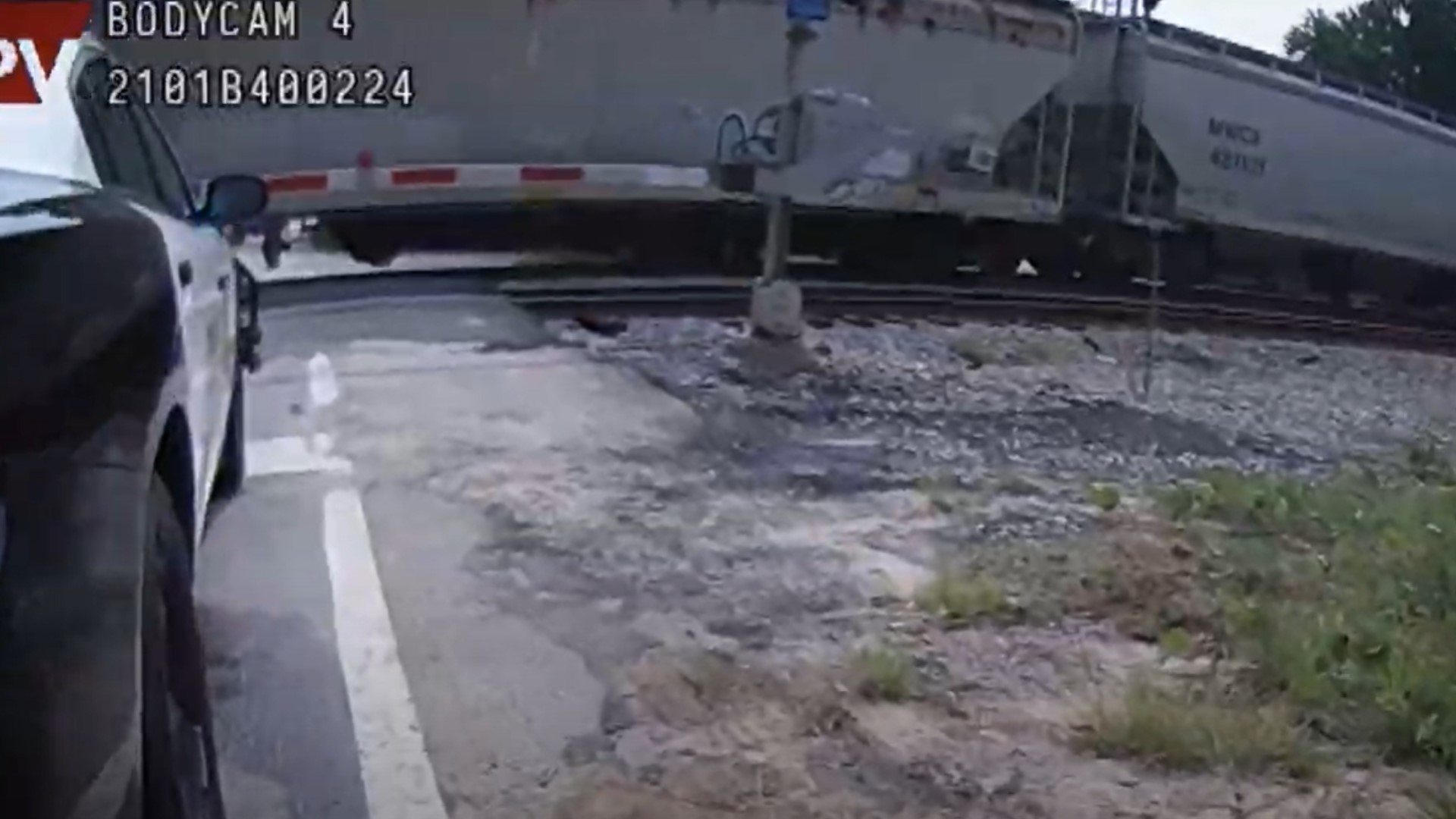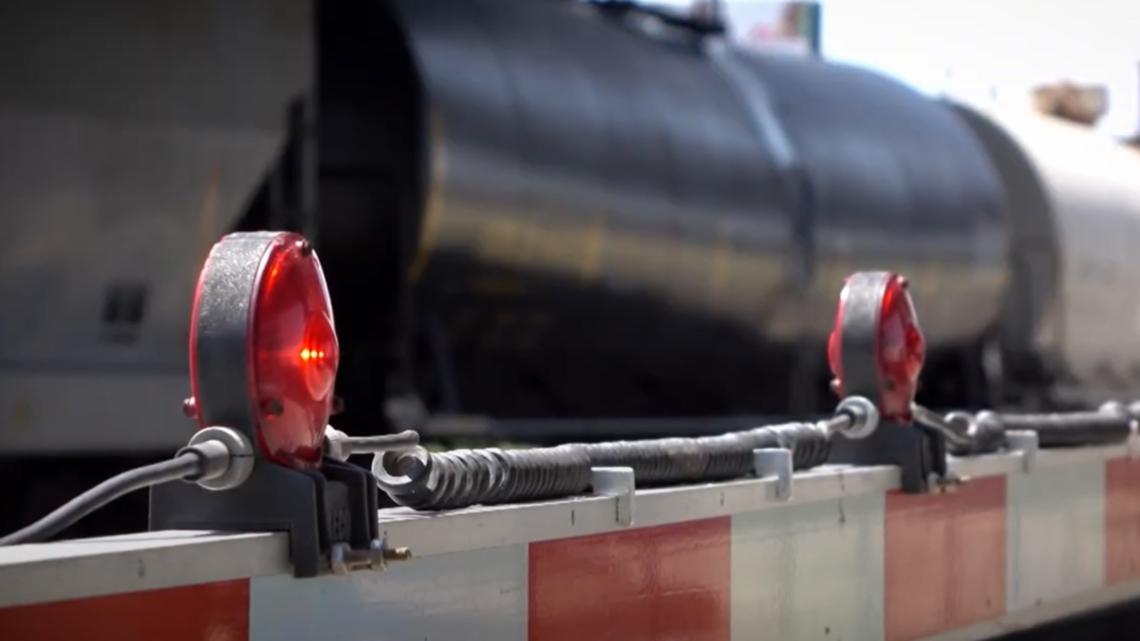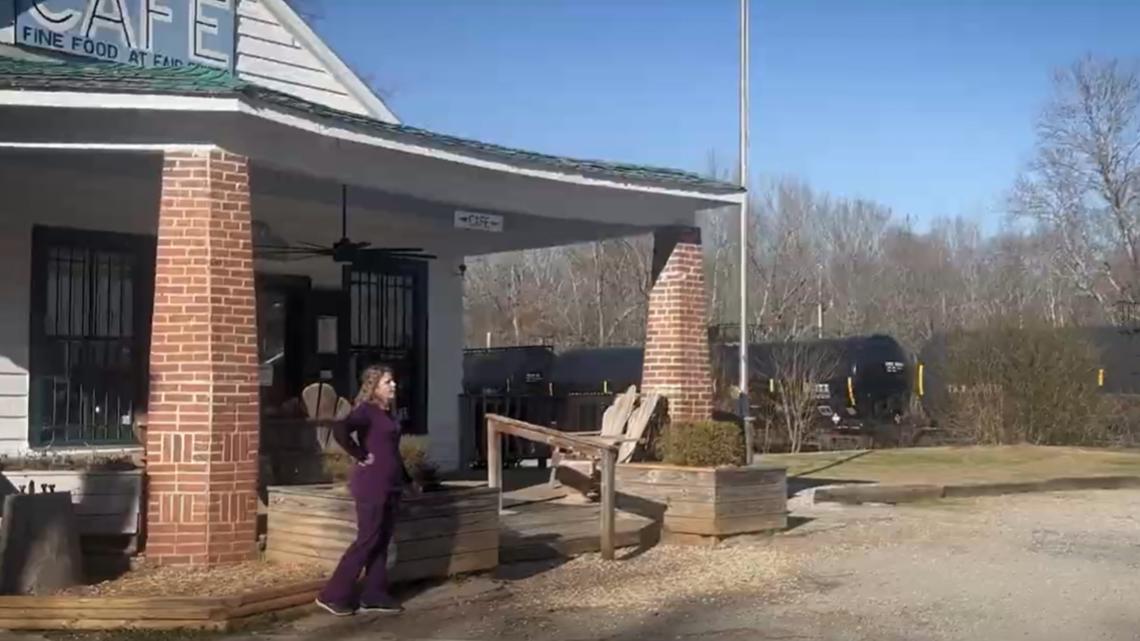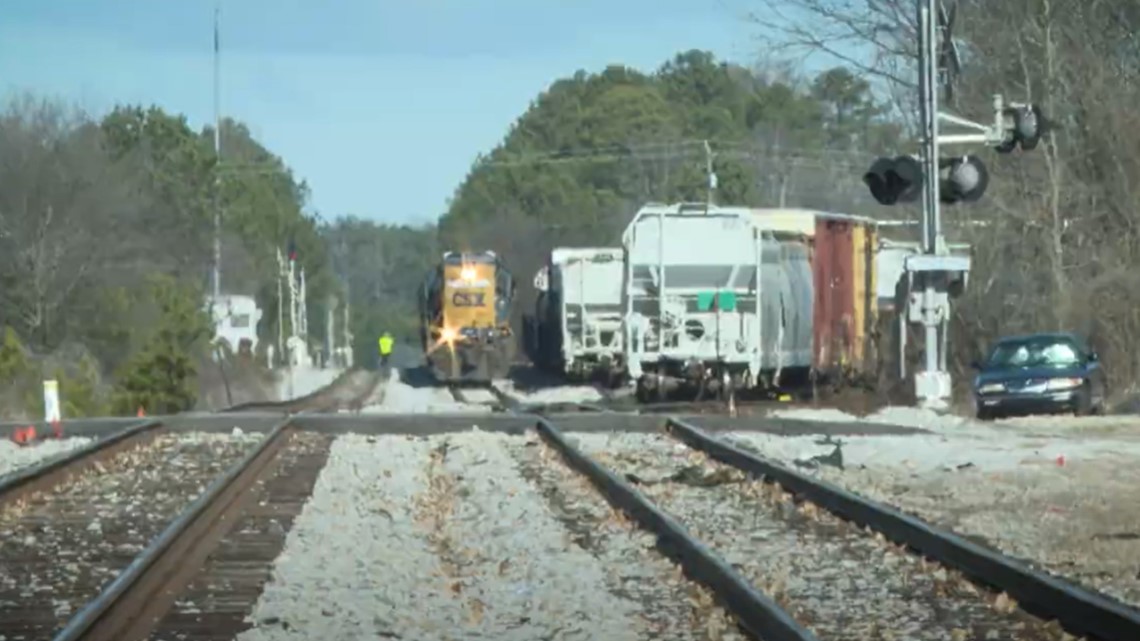Not just a small-town problem: Georgia’s stalled trains endangering communities
Lilburn resident Charlotte Owens said while she was having a heart attack, EMS couldn't get to her because of a stopped train blocking the crossing.

Despite promises from state and federal leaders to address the issue, reports of trains blocking railroad crossings continue to pour in from Georgia residents.
In the past year to date across Georgia, more than 650 complaints about trains stopped or stalled on the tracks were submitted to the Federal Railroad Administration's Blocked Crossing Incident Reporter. That portal was established by the FRA in 2019 as a way for the public and law enforcement to report blocked crossings in response to a growing number of complaints.
But FRA Administrator Amit Bose said the agency is limited in its authority to compel railroad companies to do anything about it.
"There is not a regulation at the federal level on blocked crossings," said Bose. "The portal is a useful tool but it doesn't give us enforcement authority. It doesn't give us the ability to fine railroads if there's a situation where they're blocking crossings."
While the collection of data may be relatively new - the issue itself is not. In fact, some neighbors say it's only getting worse.
An issue gaining momentum
Sixty percent of the reports over the last year noted the blockages lasted multiple hours or days.
Charlotte Owens said the often-stopped train outside her home near downtown Lithonia is a constant reminder of the day it almost cost her life.
“I was having a heart attack, and EMS could not get to me because the train was there," Owens recalled. "It was terrifying. One of the medical people had been to my house before, and he got out and walked to me. He came under the train. If he had never been there, I could have died.”
Owens said it's a near daily occurrence to see people crawling underneath the stopped train to get to school, work, or the store.


"We've got elderly people, we've got people in wheelchairs," she said. "The train sits there for weeks at a time, and nothing's been done for years."
Owens and neighbor Nilda Carter say they've called and written countless times to local leaders and to CSX, the company that operates the train that runs through their town.
Carter admits she has suspicions that their lower-income neighborhood is being willfully ignored.
"It's very dangerous, but they just don't care," she said. "I'm not trying to be racial, but you don't see this in other neighborhoods."
11Alive Investigates reached out to CSX about the Lilburn crossing and dozens of other commonly reported trouble areas across the metro. A spokesperson did not address those locations specifically but said in a statement,"we make every reasonable effort to ensure that our trains occupy grade crossings for the shortest time possible. Each crossing is different and blocked crossings can occur for various reasons, including shifts in customer needs, meet ups with other trains, or as a result of the dynamic demands of the supply chain at ports or other modes of transportation."
Further south in Juliette, Georgia, lifelong resident Andrea Goolsby has spent years appealing to Norfolk Southern about the train that often blocks the only crossing into town.
"I finally did get a response, but it was like, 'Oh, it doesn't look like many people live around there, so it doesn't matter,'" Goolsby recalled. "We're a rural area, and it feels like we just don't matter over here."
Goolsby said their fight came to a head in 2021 when a stopped train blocked EMS' access to a 73-year-old woman who had been hit by an impaired driver.
The only way around the crossing is a 35-minute drive.
“They put her on a stretcher and pushed her under the train," Goolsby said.
Traffic and tourism has continued to grow in Juliette since the release of the 1994 hit movie Fried Green Tomatoes, which was filmed in the small town.
"We've been labeled here as a podunk town, but we matter just as much as the citizens in a big city," Goolsby said. "We're close knit. We stick together, and we fight together."


Not a small-town problem
The truth is, it’s not only a small town problem.
Hundreds of reports were made in 2023 from metro Atlanta's biggest counties, including Fulton, Gwinnett, Clayton, Cobb, Monroe, and Dekalb.
"It's not just one neighborhood, it's not just one crossing," said Rebecca Serna, executive director of Propel ATL, a nonprofit advocacy organization dedicated to pedestrian safety. "It's really more of a pervasive problem that we're seeing across the city."
And it's a problem Serna herself has firsthand experience with. Outside her son's daycare in West End Atlanta sit railroad tracks and a crossing she says is frequently blocked by a stalled train.
"We would have to backtrack on some pretty dangerous streets just to be able to get to daycare in the morning," she said. "Sometimes as a parent, you're forced to do things that maybe are not ideal, including even passing the baby between the train cars if you're running late and need to keep your job."
Dekalb Fire Chief Darnell Fullum said the county has more than 180 railroad crossings to navigate when they respond to emergency calls.
"It is a challenge, we recognize it, and we're aware of it," he said. "When our crews are responding to calls, they know where they're located. They're looking for the trains. They're listening for the trains."
Fullum said if a train is blocking a crossing, firefighters have plans in place to quickly re-route or call for additional resources from other parts of the county if needed.
In Cobb County, Fire and Rescue crews practice and train specifically for situations where a train may be blocking their access or route to an emergency, according to Public Information Officer Chris Smith.
"Train blockages can be a nuisance, but it's really just an innate part of who we are and what we do every day," Smith said. "The railroads have been very good working with us, they spent a lot of money to send our responders to training. We even have plans to if we need to get water supply across the railroad track, we can do that."
Smith said if any residents are concerned about emergency services being able to access their homes, they should call their local department's non-emergency number.
“If your neighborhood or your business is blocked, reach out to your fire department," he said. "They would be more than happy to put a plan together or even be a liaison with you to the railroad company to say, 'Hey, how can we solve this problem?'”
Who can be held accountable?
But many residents say their complaints to train companies and lawmakers have fallen on deaf ears.
“If they had to sit here at this train for hours every day to make it to the Capitol, it would be different," Goolsby said.
Thirty-seven states have laws limiting how long trains can sit on the tracks, but Georgia isn’t one of them.
"They don't have to answer 'why right now,' they can kind of do whatever they want," Goolsby said. "But just because you can do something doesn't mean you should. It doesn't make it right."


Getting solutions on track
A 2023 bill backed by Georgia U.S. Sen. Rev. Raphael Warnock aimed to give community members a federally mandated method to report stalled trains in their neighborhood directly to rail carriers. But it, too, stalled out in Congress and hasn't become law.
A spokesperson for Norfolk Southern, one of the two largest railway companies in Georgia, told 11Alive in a statement:
"We make every effort to avoid inconveniencing communities with a stopped train. Trains have to stop for a number of reasons, including congestion on the tracks or in yards, coordinating traffic with other railroads, federally mandated crew rest time, or mechanical issues."
The spokesperson added that Norfolk Southern is currently looking at solutions that would alleviate the issue at Juliette Road.
However, for many neighbors like Goolsby, after years of frustration, those explanations feel like excuses.
"It's not a good excuse when it happens multiple days in a row at the same time every day. It's hard to believe," Goolsby said.
In August 2023, Norfolk Southern announced a new Director of Public Engagement role it says is designed to focus on issues like blocked crossings.
"We also partner with communities to identify short-term and permanent solutions such as overpasses and closing crossings where it makes sense, as well as contributing funds directly to communities and helping them to apply for infrastructure grants," a spokesperson for the company said.
The FRA does have an office specifically dedicated to crossing safety.
"That office works with communities throughout the country and railroad companies directly so that they can address block crossings," Bose said. "We also use our grant programs so that if there's a blocked crossing, we're eliminating that blocked crossing by building an underpass or overpass."
In 2023 as a part of a bipartisan infrastructure law, the FRA awarded Georgia $3.2 million for railroad projects across the state. Bose said those funds were dispersed among several Georgia counties, including Gwinnett and Dekalb.
When 11Alive Investigates' Savannah Levins asked for specifics on those projects and when solutions might be implemented, Bose said it may be a while.
"These projects in many cases take a long time to put together," Bose said. "They require engineering, design, environmental process. It also means working with the local governments, working with the state of Georgia, working with railroad companies like Norfolk Southern, which is not easy to do. But there is a path to do that."
Bose said communities are invited to apply for infrastructure grants and funding.
A CSX spokesperson said the company is partnering with communities throughout the CSX network to apply for funding from the Bipartisan Infrastructure Act, to modernize grade crossings or eliminate them altogether.
"We believe that public safety is everyone’s responsibility, and solutions require engagement from both the public and private sector," a CSX spokesperson said.
While many local advocates and neighbors acknowledge the economic importance of the railways, they say more needs to be done.
"Atlanta was a city built around the rail intersection and it remains a really important part of our economy," Serna said. "But at the same time, we have to be able to balance out some of those economic needs with human needs."
11Alive Savannah Levins spoke with Propel ATL and a representative of the FRA. Watch her conversations in the video below.
Have a tip for 11Alive Investigators? Text "investigate" to 404-885-7600 or email us at investigates@11alive.com. Your story and information are important to us, we'll make sure it gets to the right person on the team who may be in touch.

